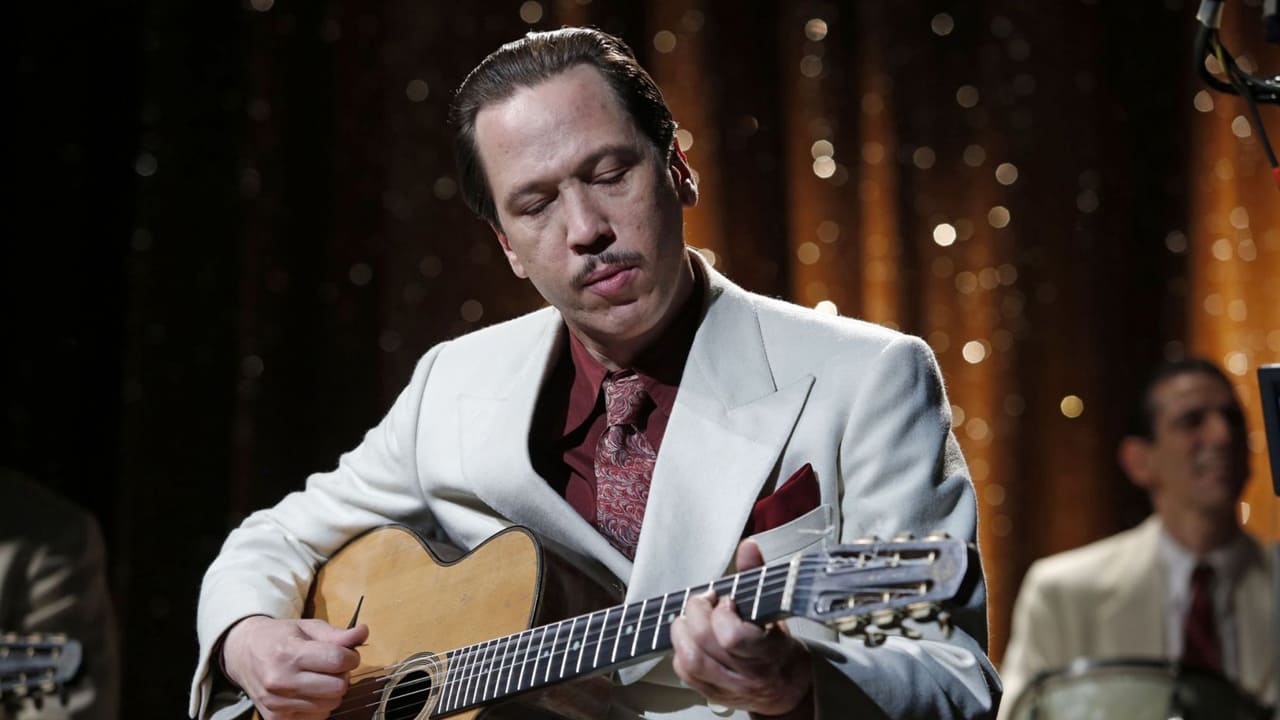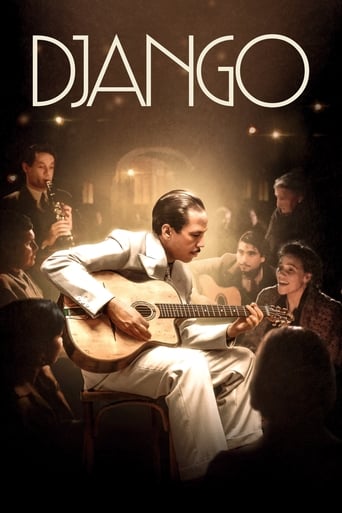



This is How Movies Should Be Made
Really Surprised!
Excellent, a Must See
There is, somehow, an interesting story here, as well as some good acting. There are also some good scenes
View MoreThe movie is wildly inaccurate and often does not display important occurrences as they have actually happened. I don't want to spoil anything here but if you are familiar with the life of Mr Reinhardt and compare it to crucial stories being portrayed in the movie, you will find plenty of inaccuracies. I really wanted this movie to be good but its not. Hopefully someone else will take another shot at this.
View MoreThis film covers mostly 1943 as well as a bit in May, 1945 at the end. So, obviously this film is not Django Reinhardt's entire life story. It's a shame but I can certainly understand why they chose this path. If you want to know more about the man, check Wikipedia and go from there.The film picks up in the middle of WWII. Django is a big star in Paris and is even loved by the occupying Nazis. What makes this so unusual is that he was one of the Romani (aka Gypseys) and they were hated and persecuted by the Reich. Additionally, he played swing...a style music associated with black Americans...a group also despised by the German government. Problems develop when the Nazis insist he do a tour of Germany and Django is worried he'll never return. So, they decide to make a run for it. The movie is all about this period of time.The film is something I really appreciated because tons of films have been done about the Jewish Holocaust. These are excellent films but the Romani were also gassed in large numbers and I can't think of a single film that covers it other than this one. It makes for a sad viewing experience...but also a masterfully crafted one well worth your time.
View MoreThis is story of an exceptional artist stuck in Nazi-occupied France and the treatment of his community of gypsies in the form of an adventure to escape the country. The most enjoyable bits are those in which he plays music with his band in front of Nazi or french audiences, where his style and technique transpires exceptionally well and the people are lifted to a trance. However, the subject of the movie is grim and filmed in no special way. Django Reinhardt is caught between the between a rock and a hard place and though the tale is told like an adventure, one feels frustrated by the melancholy and the hardship. No more than he of course!
View MoreThis movie was shown at the festive opening of the Berlinale 2017, a gathering that attracts lots of important guests from all over the world, as well as sponsors and local politicians who want to be included and photographed. As usual, the general public is left uninvited (I digress, this being a different matter altogether). I had to go to a repeat screening the day after. Because this movie was also selected for the Competition for the prestigious Golden Bear, in addition to being chosen for the opening, all this gives rise to expectations. It brings you in the mood for something novel or original or discovering new grounds. Alas, neither of this was the case.Though the central plot of this film is my favorite theme "how will I act in similar circumstances?", nothing that I saw here could involve me, nor did it show something that I consider thought provoking. I had even trouble staying awake (may have other reasons). It was nice to watch how they have reconstructed the buildings and dresses of the WWII time, but that is something that belongs to the trade of a costume drama or historical documentary, and these two genres mostly fail to attract me (I know of a few exceptions, however). Remains an intriguing plot or interesting dramatic developments, but my hopes disappeared little by little and none of these promises became fulfilled.It looks like the main protagonist Django stretches his luck much farther than anyone should be trusted to do. Maybe because his music moves hearts and conquers even the strongest opponents, Django's usual experience is that everyone falls for it, giving him the last word, that is until now. His refusal to cooperate with the Germans is a daring act, but I think he did it for artistic reasons and nothing else (the Germans had a list of musical genres and especially rhythms he was not allowed). I doubt there were fundamental principles involved, nor had he thought of the consequences for others in his environment, like his family, his colleagues and his fellow-gypsies. This film lets us see how irresponsible that was, and what a powerful enemy like the German army can do in order to get what they want. On the other hand, the Germans were not shown as pushy either, since they could have brought in several other means of persuasion. Due to all of the above, all main protagonists felt like cardboard characters, unclear what makes them do what they do.Finally, on a more positive note: In a final scene we saw and heard the presentation of a musical piece, one for which we saw that he had sketchy ideas years earlier. It was May 1945 so after WWII, a piece for choir, organ and orchestra as per his original sketches. We saw it being directed (very loosely) by Django himself (so Django survived; is that a spoiler?). It was a sort of Requiem, but I don't remember the details. It sounded impressive, as church music sometimes does, and the fragment we heard was much longer than just a few measures. I like this sort of music better than the "jazzy" notes we heard in abundance in the earlier scenes, but I wonder whether the average viewer can stand this "classical" sort of music, and especially the organ for which most people have nasty memories, and they spontaneously dislike the instrument because of it.
View More